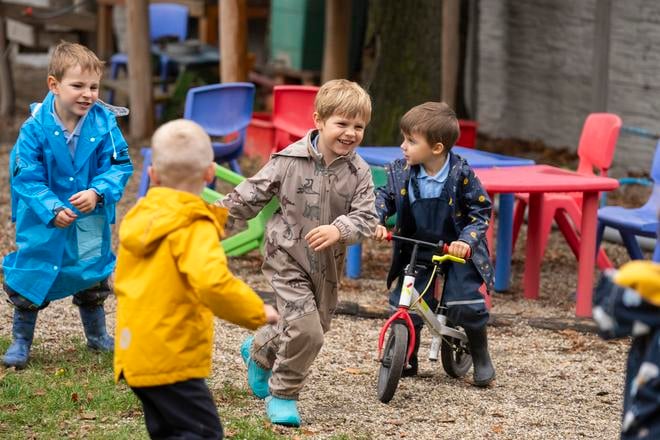Rose Winter is Head of Early Years at The British International School Bratislava.
At The British International School Bratislava, Early Years children experience outdoor learning come rain or shine. Outdoor learning is a valued part of the curriculum and the impact on young children’s development stretches beyond simply playing outside. There are seven key areas that outdoor learning has an impact on, which are discussed in more detail below.
Physical development
One of the most immediate benefits of outdoor learning for young children is the impact on physical development. Outdoor environments naturally encourage active play, whether it's running, climbing, jumping, or exploring. These activities help children develop gross motor skills, strengthen muscles and bones, and improve coordination and balance. Outdoor learning provides opportunities for exercise that inside classrooms lack, contributing to overall physical health and development in young children. The outdoor environment additionally provides activities to learn new skills which are not possible inside, such as riding a bike.
Cognitive development and learning
Outdoor learning offers a dynamic, hands-on learning environment where children can engage with the world around them in ways that stimulate curiosity, problem-solving, and critical thinking. Nature is rich with opportunities for discovery, and outdoor learning encourages children to ask questions, explore their surroundings, and make connections with the physical world. Nature-based play also encourages creativity and imagination, which in turn supports cognitive development and enhances a child's ability to focus and engage in more structured learning when they return indoors.
Emotional and mental health benefits
Spending time outdoors provides multiple benefits for emotional well-being. Nature has been shown to reduce stress, anxiety, and mental fatigue. In the Early Years, children often face emotional challenges, such as managing big feelings or navigating new experiences. Outdoor learning allows children to regulate emotions more effectively, as natural settings offer a calming influence that promotes emotional resilience. Additionally, outdoor learning environments offer a sense of freedom and autonomy, which are important for developing self-confidence and independence. As children take risks, explore new spaces, and engage in unstructured play, they gain a sense of accomplishment and self-worth. This, in turn, strengthens their emotional regulation development and promotes positive mental health.
Social skills and collaboration
Outdoor learning provides rich opportunities for social interaction. When children engage in group activities, whether it’s building a fort, playing games, or working together to solve problems, they develop key social skills. Communication, teamwork, empathy, and conflict resolution are all learnt in these outdoor settings, often more effectively than in indoor classroom settings. During outdoor learning, children are encouraged to collaborate, share ideas, and support one another, fostering a sense of community and belonging. By working together to solve problems and navigate the challenges of outdoor play, young learners also develop the ability to negotiate and adapt to different social situations, which are key to building healthy relationships.
Connection to nature
Outdoor learning also helps foster a strong connection to the natural world. When children regularly engage with nature, they begin to understand the importance of protecting the environment and preserving natural resources. These early experiences can cultivate an appreciation for biodiversity, sustainability, and conservation efforts that will stay with them throughout their lives. As children observe and interact with the natural world, they also learn to appreciate the value of every living thing. This awareness can help build a generation of children who not only enjoy the outdoors but also actively care for it.
Encouraging risk-taking and independence
Outdoor learning allows children to encounter controlled risks that help them develop decision-making skills and learn about safety. For instance, climbing a tree or jumping off a child-built tower of crates requires children to assess risks and make informed choices. Such activities encourage a healthy attitude towards risk, helping children become more confident in their abilities and at overcoming challenges. Furthermore, outdoor learning allows for more independence and exploration. Without the constraints of indoor spaces, children can explore on their own terms, make their own discoveries, and gain the confidence to tackle new tasks without adult intervention.
Fostering creativity and imagination
Outdoor environments are inherently open-ended and flexible, offering a wide variety of stimuli that encourage creative thinking and imaginative play. From constructing imaginary worlds with sticks and stones to pretending to be animals or explorers, children are free to let their imaginations run wild in ways that are often stifled indoors. Unstructured outdoor play provides the space for children to invent games, scenarios, and narratives, all of which are important for cognitive development and problem-solving skills. As children use natural materials to create their own toys and structures, they also develop their fine motor skills and spatial awareness.
Incorporating outdoor learning into the early years of a child's development is not just about giving them time to play outside; it is an essential aspect of their overall growth. It promotes physical, cognitive, emotional and social development, setting the foundation for lifelong learning and well-being. By encouraging children to connect with nature, take risks, collaborate with peers, and explore the world around them, outdoor learning cultivates essential life skills that support success both inside and outside the classroom. With all these benefits, it’s clear that outdoor learning is an invaluable resource for fostering well-rounded, healthy, and engaged learners.

